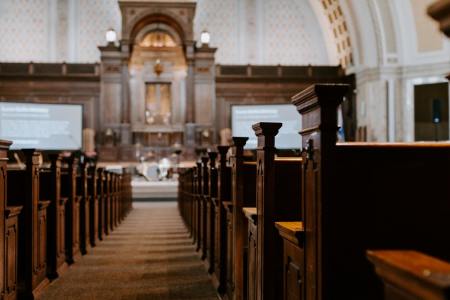Episcopal church pays ‘voluntary tax’ to indigenous tribes as form of land acknowledgment

An Episcopal church in Wisconsin has included in its budget a voluntary tax on its property to give to the state's Native American tribes to acknowledge that it stands on land that "used to be someone else's homeland."
St. Dunstan's Episcopal Church in Madison added a budget line in 2022 for a $3,000 "amends" property expense payment, which was presented in August to the Wisconsin Inter-Tribal Repatriations Committee, Episcopal News Service reported. The payment represents 1% of the church's overall expenses.
Located on Madison's west side, the church sits on land that historically was home to members of the Ho-Chunk Nation.
The payment comes after the church spent years studying the region's indigenous history and how tribes lost land to settlers through a land acknowledgment task force.
According to a statement on the church's website, the land first came under the ownership of the U.S. Government after the 1832 Black Hawk War, a conflict between the U.S. government and Native Americans led by Sauk leader Black Hawk.
The war resulted in local native tribes being largely "exterminated or pushed westwards, after being forced to cede their land in southern Wisconsin."
"Anticipated development failed to occur and the indigenous Ho-Chunk continued to return, despite their' official removal' in 1832, to hunt, fish, and grow corn at traditional camps on the north shore of Lake Mendota and Pheasant Branch. Speculators lost interest in and money on the surrounding property, and eventually Wisconsin Governor William Farwell purchased O'Neill's parcel," the website reads.
The property that became the site of the church was a former farm on the edge of town with a red-brick farmhouse owned by Joseph and Anton Heim, immigrants who were among the many who came to the U.S. during a failed revolt in the Germanic states in 1848. The Heims farmed the property for years and got involved in local politics.
"The farm shrank over the years as Middleton began to grow and farmland was sold off to be developed," the website explains. "Several families owned the farmhouse over the years. A couple of photos in the Wisconsin History Museum collection show it in 1952."
The website concludes: "St. Dunstan's is mindful that we gather to worship on Ho-Chunk land, taken unjustly. We don't know what it looks like to make peace with that history, but we wonder."
According to the church's rector, Rev. Miranda Hassett, the church's research and statement needed to be accompanied by "restorative actions" to "make amends" and be "better allies."
"It would feel wrong getting that statement out there without having the meat of what that means to us," Hasset told Episcopal News Service.
Many other Episcopal congregations are researching and developing land acknowledgments to foster reconciliation.
For example, a plaque installed on the pavement outside the door of St. John's Episcopal Church in Chicago states: "You are standing on the land of Native peoples."
In July, the denomination's 80th General Convention passed a resolution encouraging land acknowledgments. Each Episcopal diocese will complete audits "of all Indigenous peoples whose ancestral and territorial homelands its churches and buildings now occupy."
The resolution also encourages the dioceses "to begin a process of implementing land acknowledgment liturgies and prayers to begin any public meetings or worship and to provide resources to their churches to do the same."
In Washington, the Seattle-based Diocese of Olympia passed a similar resolution in 2019.
"Though it begins as an effort to understand the history of an individual church, it can soon develop into an exploration of the history of our entire country and even the world," the diocese says on its website. "All are connected, for good or ill, in the story of who we are as a people, as a nation, as Episcopalians, and as Christians."
Other dioceses are also encouraging churches to consider land acknowledgments. The Episcopal Church's Virginia Theological Seminary Building Faith ministry offers churches guidance for writing land acknowledgments.
"One of the ways the church begins the road to reconciliation with siblings who identify as Indigenous/Native American, is to acknowledge that all churches sit on Native Land," the guidance states. "It was 'purchased' through treaties that were constantly broken. It was stolen through lies. Tribal nations were violently forced from ancestral lands to distant reservations."






















